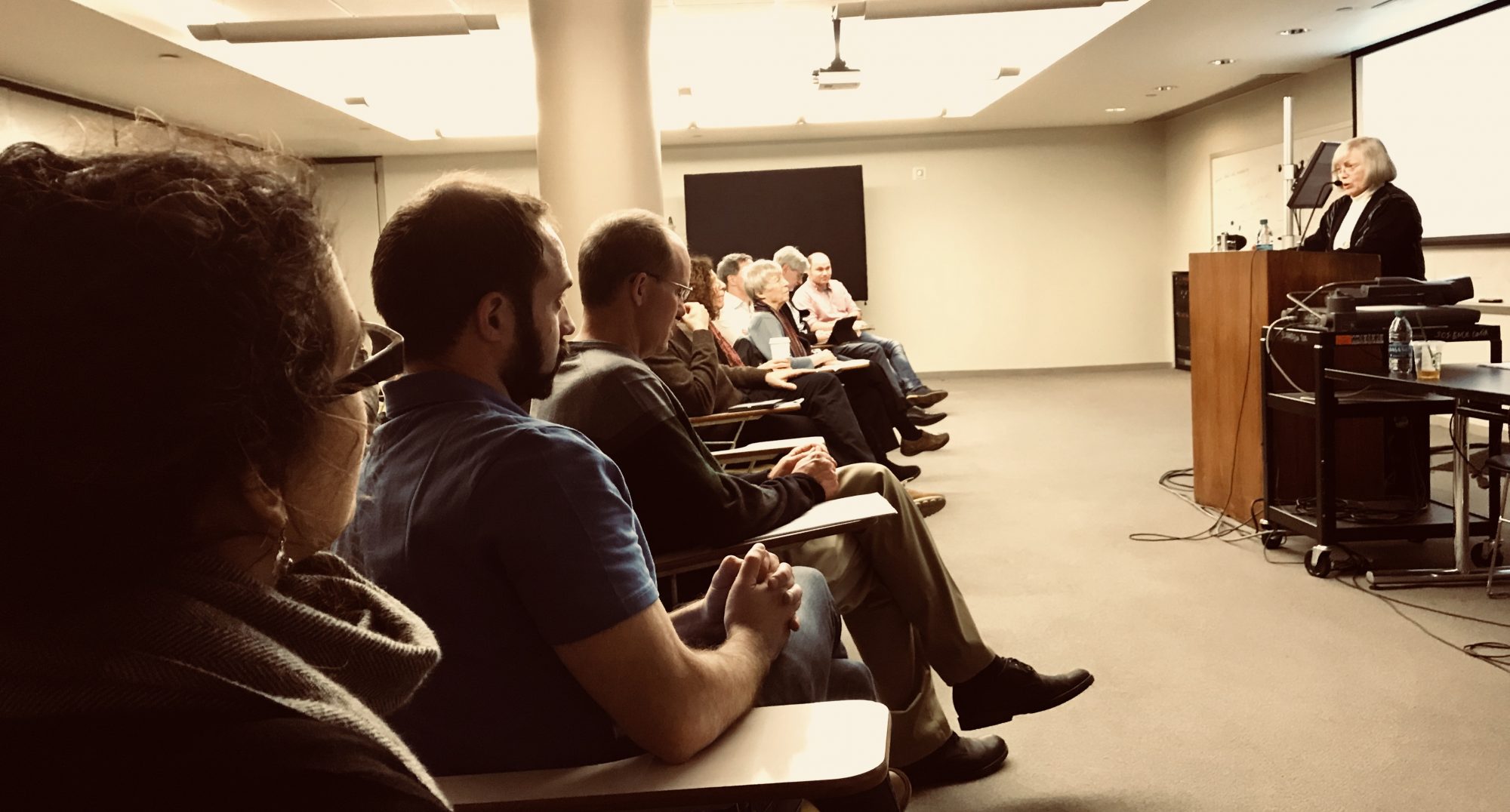 (PhD Columbia, 1985; Prof) Economic and political anthropology, historical anthropology, social movements, development; Latin America (medelman@hunter.cuny.edu)
(PhD Columbia, 1985; Prof) Economic and political anthropology, historical anthropology, social movements, development; Latin America (medelman@hunter.cuny.edu)
Marc Edelman’s research and writing have focused on agrarian issues, social movements, and a variety of Latin American topics, including the historical roots of nationalism and contemporary politics. Most of his work has dealt with changing land tenure and land use patterns, production systems, rural class relations, and social movements in Central America. He has a longstanding concern with understanding changing forms of capitalism and with the politics of controlling markets, whether through welfare states, civil society pressure or global trade rules. During the mid 1980s, after seeing his fieldwork zone in northern Costa Rica tragically converted into a staging area for the civil war in Nicaragua, he also carried out research in the USSR and wrote extensively on Soviet-Latin American relations. View his CV.
Currently, Edelman is initiating a project, supported by the National Science Foundation, on the efforts of transnational agrarian movements to have the United Nations approve adeclaration, and eventually a convention, on the rights of peasants. He is also completing a book on peasant involvement in global civil society movements and transnational networking among small farmer organizations.
In The Logic of the Latifundio: The Large Estates of Northwestern Costa Rica since the Late Nineteenth Century (Stanford, 1992; Spanish edition, Editorial de la Universidad de Costa Rica, 1998) Edelman challenges the assertions of economists, historians, and other social scientists who for decades asserted that the massive underutilized properties found in rural Latin America were disappearing or would disappear with the rise of modern market economies. Instead, he argues, contemporary extensive land use is rooted in the availability of “institutional rents” (e.g., subsidized credit, pro-latifundist fiscal policies), high risk levels due to unpredictable precipitation, and patterns of inheritance within elite families which permit modern latifundists to ignore the price of land in their calculations of profitability.
Peasants Against Globalization: Rural Social Movements in Costa Rica (Stanford, 1999;Spanish edition, Editorial de la Universidad de Costa Rica, 2005) examines changing peasant responses to free market policies and to the dismantling of Costa Rica’s “statist” economy and social welfare system. More broadly, it seeks to critique recent trends in studies of social movements, peasantries, and development theory. The research for this book involved an uneasy encounter with engaged ethnography and the ethical dilemmas that anthropologists confront during fieldwork.
“Development is a matter of life and death,” Marc Edelman and Angelique Haugerud argue in the Introduction to their edited volume, The Anthropology of Development and Globalization: From Classical Political Economy to Contemporary Neoliberalism (London: Blackwell, 2005). They ask whether development is a powerful vision of a better life for the half of the world’s population who subsist on two dollars a day or whether it is a failed Enlightenment “master narrative.” This book provides an encyclopedic overview of the history of the field, with extensive critical commentaries from the editors and contributions from thirty-one other authors.
Social Democracy in the Global Periphery: Origins, Challenges, Prospects (Cambridge University Press, 2007), by Richard Sandbrook, Marc Edelman, Patrick Heller, and Judith Teichman, is a collaborative project that examines social-democratic experiments in developing countries and their viability in the face of globalization. It analyzes four exemplary cases: Kerala (India), Costa Rica, Mauritius, and Chile (1964-73, and since 1990). These exemplars demonstrate that socio-economic development and democracy can occur under divergent circumstances of capitalist transformation. They stand out as significant exceptions in a developing world mired in poverty, inequality, illiteracy, hunger, and authoritarian and corrupt governance. Their relative success in responding to globalization’s challenges derives from the legacies of past social-democratic policies: human capital investment, good infrastructure, industrial policies, and an advanced capability for conflict management.
In the Introduction to Transnational Agrarian Movements Confronting Globalization(Wiley-Blackwell, 2008) editors Saturnino M. Borras, Jr., Marc Edelman and Cristóbal Kay ask how recent changes in global political-economy have affected the capacity of the “rural poor” to understand their condition, assess political opportunities and threats, frame their worldviews, forge collective identities and solidarity, build movements and launch interlinked collective actions. Borras, Edelman and Kay analyze little-known transnational agrarian movements of the early twentieth century and contemporary high-profile global alliances, such as Vía Campesina. Readers of this book will also encounter peasants and farmers who struggle at home and traverse national borders to challenge the World Trade Organization, activists in Brazil who uproot genetically modified soybeans, forest dwellers in Indonesia who chop down rubber plantations to cultivate rice to feed their families, “runaway villages” in China that take up arms to resist corrupt officials, and Mexican migrants who, having exited in desperation, return from abroad to transform their communities.
Edelman has served on the editorial boards of American Anthropologist (Book Review Editor, 2002-5), Anuario de Estudios Centroamericanos (Consejo Editorial Internacional, 2008-), Critique of Anthropology (1998-), Cuadernos de Antropología (Comité Científico, 2009-), Culture & Agriculture (1995-98), Focaal-European Journal of Anthropology(2004-), Journal of Agrarian Change (2008-), Journal of Latin American Anthropology(1994-99), Journal of Peasant Studies (Editorial Collective, 2009-), Latin American Research Review (2000-2003), NACLA Report on the Americas (1999-2006), and Studies in Comparative International Development (2005-).
Representative publications (other than those mentioned above):
- 2012 “Rural Social Movements,” The Wiley-Blackwell Companion to Political Sociology, Edwin Amenta, Kate Nash, and Alan Scott, eds. Oxford: Wiley-Blackwell, pp. 429-41.
- 2011 “Peasants’ Rights and the UN System: Quixotic Struggle? Or Emancipatory Idea whose Time has Come?” Journal of Peasant Studies 38(1): 81-108 (co-author Carwil James).
- 2009 “Peasant-Farmer Movements, Third World Peoples, and the Seattle Protests against the World Trade Organization, 1999,” Dialectical Anthropology 33(2): 109-28.
- 2009 “Synergies and Tensions between Rural Social Movements and Professional Researchers,” Journal of Peasant Studies 36(1): 247-67.
- 2008″Transnational Organizing in Agrarian Central America: Histories, Challenges, Prospects,” Journal of Agrarian Change 8(2&3) (April/July): 229-257.
- 2005 “When Networks Don’t Work: The Rise and Fall and Rise of Civil Society Initiatives in Central America,” pp. 29-45 in Social Movements: An Anthropological Reader, June Nash, ed.. London: Blackwell.
- 2005 “Bringing the Moral Economy Back In… to the Study of Twenty-first Century Transnational Peasant Movements,” American Anthropologist 107(3) (Sept.): 331-345. [Spanish version in Revista Estudios Sociales Comparativos (Colombia) 1(1): 87-119].
- 2004 “Development,” in A Companion to The Anthropology of Politics, David Nugent and Joan Vincent, eds., pp. 86-106. London: Blackwell (co-author Angelique Haugerud).
- 2003 “Transnational Peasant and Farmer Movements and Networks,” pp 185-220 inGlobal Civil Society 2003, Helmut Anheier, Marlies Glasius, and Mary Kaldor, eds. London: Oxford University Press.
- 2002 “Toward an Anthropology of Some New Internationalisms: Small Farmers in Global Resistance Movements,” Focaal – European Journal of Anthropology 40:103-122.
- 2001 “Social Movements: Changing Paradigms and Forms of Politics,” Annual Review of Anthropology 30:285-317.
- 1998 “Waiting for Fidel: Small Hopes and Great Travails in Havana,” Dissent 45(4) (Fall):11-17.
- 1998 “Transnational Peasant Politics in Central America,” Latin American Research Review 33(3):49-86. [Spanish version in Revista Mexicana de Sociología 60(4): 277-319].
- 1998 “A Central American Genocide: Rubber, Slavery, Nationalism, and the Destruction of the Guatusos-Malekus,” Comparative Studies in Society and History40(2):356-90. [Spanish version in Mesoamérica (Guatemala) 36: 539-91].
- 1994 “Land Inequality: A Comparison of Census Data and Property Records in Twentieth-Century Southern Costa Rica,” Hispanic American Historical Review 74(3) (Aug.):445-91 [co-author Mitchell A. Seligson, Spanish version in Anuario de Estudios Centroamericanos (Costa Rica) 20(1): 65-113].
- 1994 “Landlords and the Devil: Class, Ethnic, and Gender Dimensions of Central American Peasant Narratives,” Cultural Anthropology 9(1) (Feb.):58-93. [Spanish version in El paso del cometa: Estado, política social y culturas populares en Costa Rica (1800/1950), Iván Molina Jiménez and Steven Palmer, eds., pp. 105-44. San José: Editorial Porvenir].



